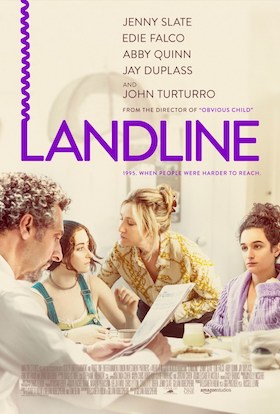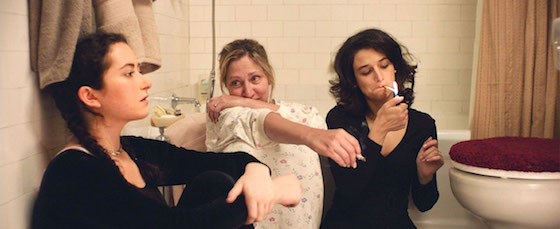[Rating: Minor Rock Fist Down] 
A Woody Allen-esque romp through 1990’s Manhattan as seen through the eyes of two young women, Landline wants to have its emotional cake and eat it too. The film explores some serious themes about love, commitment, and loyalty, yet never pushes any of its characters towards permanent growth. Thus, for non-New Yorkers looking for something more than just a car-wash-style march through the sitcom talking points of young adulthood and infidelity, Landline might come off as somewhat lacking.
Character-wise, the script for Landline does a decent enough job setting up its leads, introducing the principals via conversations contained in a quick five-minute care ride. Pat (Edie Falco) and Alan (John Turturro) are a low-level Manhattan power couple in the mid-90s raising Senioritis-infected teenager Ali (Abby Quinn) and emotionally scattered twenty-something Dana (Jenny Slate). Alan writes ad copy yet still dreams of breaking out as a playwright, while Pat seems to not even notice that she dismisses Alan’s dreams and aspirations with just about every passing comment. Pat works hard as an E.P.A. official, and admires contemporary First Lady Hillary Clinton’s attitude and fashion sense, yet like HRC, she can’t seem to get over the fact that her confidence and authority unfairly translates to “bitch” to those around her.
And then there’s the daughters. Ali is a fiery teenager with a tongue that could open a wine bottle, and is casually sleeping with an older college boy while simultaneously making questionable decisions regarding her more public extracurricular activities. Though older and more approachable, Dana isn’t doing that much better with her affairs, in that she starts having one early in the picture despite the fact that she’s engaged to a perfectly nice young man who nevertheless bores the hell out of her.
What follows is a series of horrible decisions by all four characters who, despite the lack of ubiquitous cell phones and g-chats (this is 1995, after all), can’t seem to come together and communicate. At times, this temporal setting is its own de-facto character, yet it is used for simple throwback gags (gasp, she’s using a payphone to check her answering machine messages!), and little else. There’s never a moment where a smart phone or social media would have bridged some sort of misunderstanding, or otherwise informed the story in a way that 1995 couldn’t. Indeed, except for the references to Lorena Bobbitt and Mad About You, the setting adds little to Landline, which is odd since a recurring theme of the picture seems to revolve around the importance of communication for a “modern” family.
As the picture moves into its second act, Dana and Ali uncover evidence that their father may be having an affair; this revelation brings the two sisters closer together as they humorously sort out their feelings on that shocking development and life in general. Director Gillian Robespierre made considerable hay out of injecting a cutesy sparkle into a serious topic in Obvious Child, her 2014 feature debut, and by substituting abortion out for marital infidelity this time around, she maintains that overall tone.
Yet there’s not a lot of meat on the bone here. The good work the script does for its leads early on drops off entirely for the ancillary actors, which keeps most of the character development somewhat half-baked. For example, why not make the men as nuanced and complicated as the women, forcing Pat, Ali, and Dana into some real, lasting introspection? And while this narrow scope does allow Dana and Ali to move the ball of their sister-relationship down the field, it is at the expense of hollow male characters that exist just to allow this to happen.
Dana’s fiancée is stable and kind, yet boring, while her side-man is exciting yet shallow. Meanwhile, Alan is an affectionate, caring father who nevertheless can’t communicate his feelings to his wife of twenty-plus years in any meaningful way. Landline wants to create conflict, yet seems afraid of hurting anyone’s feelings in the process, and while this may help keep up its light, frothy tone, it makes the conflicts decidedly one-sided. As is, Landline fails to accomplish more than just offer up a female-centric distillation of what Ed Burns or Woody Allen have already done to death (New York relationship neurosis), and with a thinner narrative to boot. There are a lot of moving pieces to this picture, but instead of unpacking any of the ironies (i.e., Dana struggling with her affair while grappling with the knowledge of her father’s infidelities), it goes for easy commiseration, hugs, laughs.
If this is indeed an examination of the precarious nature of monogamy, its failure to address any real, lasting consequences (emotional or practical) to the cheating on display is just that: a glaring failure. Without going into too many specifics, the main characters of this film don’t seem all that different in the last scene than they did during the first. They’ve all learned a lot about each other, sure, and the sisters find some common ground that didn’t exist before, but that’s about it. And despite some solid performances by reliable actors like Turturro and Falco, it’s hard to move past the fact that Landline feels like ten pounds of story in a twenty-pound bag. Under different circumstances, this might be good enough for a Woody Allen knock-off, yet not for Landline, or any other movie looking to stand on its own.








Comments on this entry are closed.